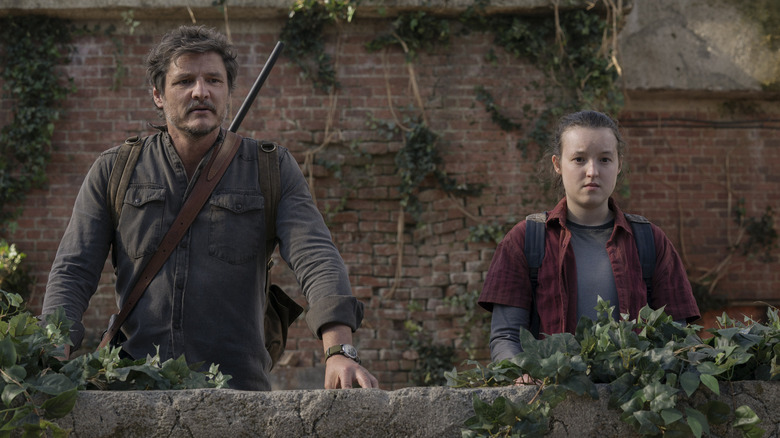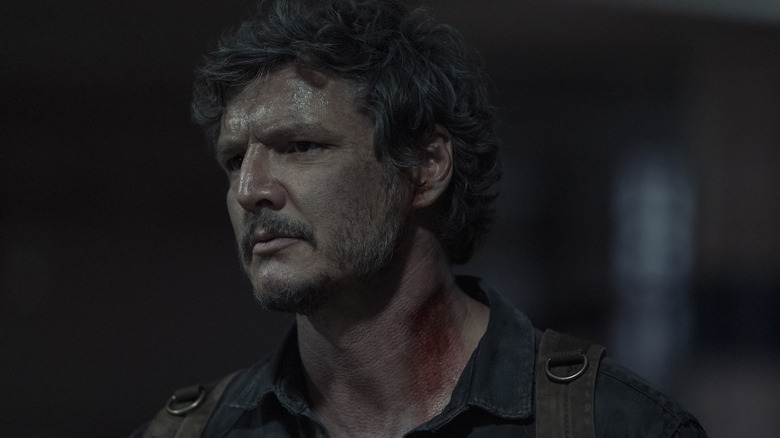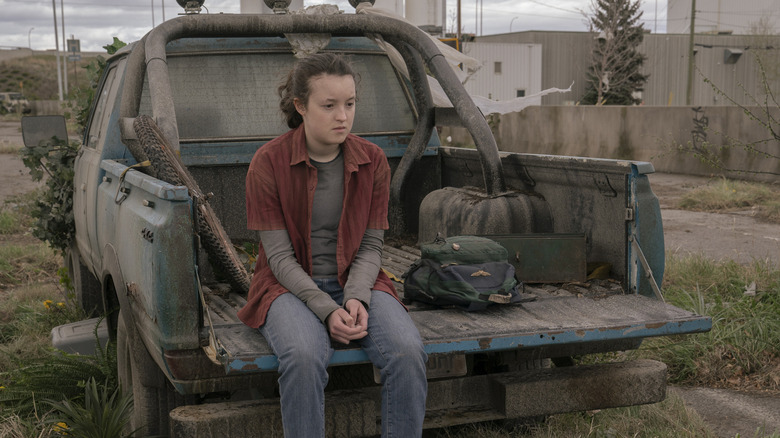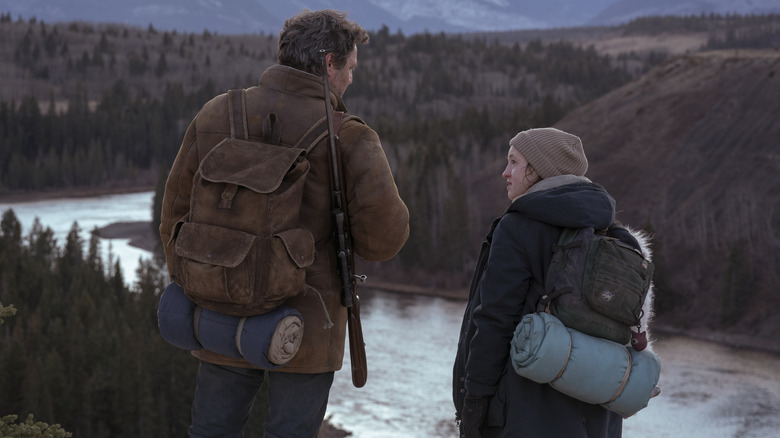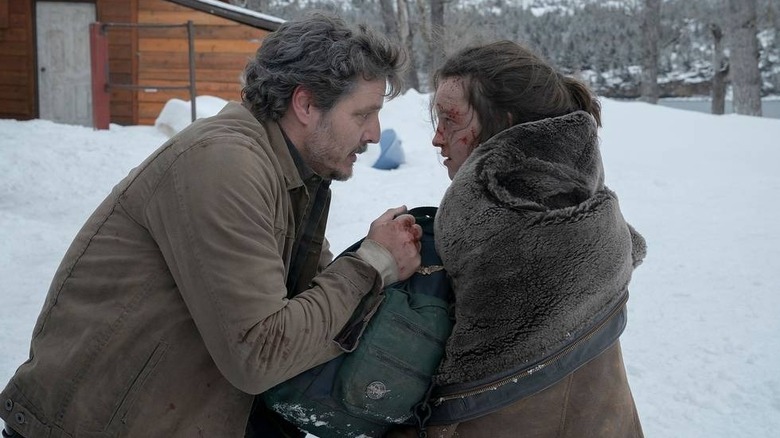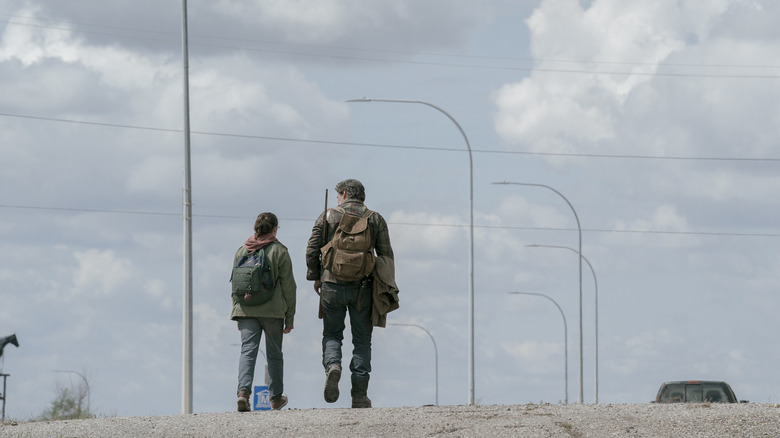The Last Of Us Season Finale Redefines What It Means To Be A Hero ... And A Villain
This post contains spoilers for "The Last of Us" episode 9.
In the span of nine harrowing episodes, Joel Miller (Pedro Pascal) has gone from emotionally detached smuggler to dedicated GirlDad. His days of referring to Ellie (Bella Ramsey) as cargo are long gone, because no matter how long he's spent perfecting the art of denial, all of his walls have crumbled in the face of this defiant 14-year-old. Come the season finale, he is already envisioning their future together: safety, board games, puns, and guitar lessons. Peace awaits them in Jackson but first, they must reach the Fireflies.
Unfortunately, there's a hitch in his plan for a happily ever after.
Just when he's begun to heal from the pain of his past, "The Last Of Us" confronts Joel with an impossible decision: Ellie, or the entire world? Studying her brain will reveal the key to fighting cordyceps, but the cost of a solution is her life. In this regard, Joel doesn't suffer alone. The audience must swallow the dread of Ellie's sacrifice too and it doesn't go down easy. How can we, who have seen this child through the worst moments of her life, hope for anything but her safety?
For nine episodes, we've seen Ellie fight tooth and nail to survive. We've seen her traumatized, abandoned, and afraid. We've seen her find glimmers of happiness in a horrifically bleak world. So the idea that humanity's only hope requires her death is heartbreaking — especially for Joel. So he takes action: to save Ellie from the scalpel, Joel murders everyone. The dwindling Firefly forces are decimated at gunpoint, including their leader, Marlene (Merle Dandridge), and the doctor capable of producing a vaccine.
On one hand, how can we fault Joel's actions? Saving a child from being dissected sounds pretty damn heroic on paper. But murdering a crew of revolutionaries who are trying to save the world feels like the dictionary definition of villainy. So which one is it?
A tragic hero or a selfish villain?
When the truth comes out in the Firefly base, Joel isn't the only one mourning Ellie's future. "I'm the only one who understands," Marlene tells Joel as he grapples with the thought of losing Ellie. She's not only known the kid since the day she was born, but made a promise to keep her safe. It pains her to make the call, but Marlene truly believes that she's acting in service of the greater good. And for that, Joel kills her. Because no matter what promises she makes with her dying breath, Joel knows that Ellie — whose life could end the infection that wiped out 60% of humanity — is too great a hope for Marlene to abandon. And he won't take that risk.
In Joel's defense, there was no guarantee that the Fireflies would succeed. Outbreak Day was two decades ago: cures have been attempted many times over. Maybe the Firefly doctor was in over his head; maybe he wouldn't have had the right equipment to pull it off; or maybe the scientist from the first cold open was right, and there's simply no way for humanity to beat Cordyceps.
But maybe he was wrong.
Maybe Ellie was the missing puzzle piece. Maybe the cure was one heartbeat away from existing. We'll never know for sure. But none of that was on Joel's mind when he acted. He had one goal in mind, and it didn't factor in the fate of humanity: Joel was hellbent on protecting Ellie, no matter the cost.
Ellie doesn't get a choice
Joel makes a decision that's much bigger than one girl. He does something that will forever impact the world. To some extent, he does it for Ellie. He knows and loves her too much to let her be harmed. But mostly, Joel saves her for himself — because he couldn't save Sarah all those years ago, and he can't bear to lose another daughter.
For a moment, let's forget about the rest of the world. Forget that humanity may have had a fighting chance against Cordyceps: a chance to no longer live at the mercy of corrupt FEDRA forces; to no longer starve in the winters; to no longer fear every single person they encounter.
Let's just consider Ellie.
Early in the episode, Joel offers her an out, trying to convince her that they can simply turn back. But Ellie shoots him down: "There's no halfway with this." She'll follow him anywhere, she admits, but only after they see this mission through. After everything she's lost, she personally needs her immunity to mean something. People have died to get her here — Anna, Riley, Tess, Sam — and those deaths can't be for nothing.
Joel, just three episodes ago, told her something crucial: "You deserve a choice." Ellie deserves agency in her own life. When it came to deciding who she should travel with, Joel abided. But in perhaps the most crucial moment of her life, he takes the decision out of her hands. And later? He lies right to her face. It's a seismic betrayal, and he understands that. He hesitates when Marlene reminds him what Ellie would want, and falters when Ellie presses him for the truth; but both times, he clings to the future that he needs them to have together.
The Last of Us never promised us any good guys
Moreso than the game, the show really leans into the selfishness of Joel's actions. As they make their return to the safety of Jackson, he's no longer plunging forward without a second thought: Joel is openly looking back. He's thinking about Sarah and the life he never had with her. He's thinking about Ellie, and all that they'll have in the future.
We can't exactly begrudge the man for reminiscing about his daughter, but there's a certain unease hanging over the final scene, as he compares the two girls with Ellie doubtfully trailing behind. She doesn't know what he's done to get her here, but she's smart enough to do the math. The thought has certainly crept into her mind. And while she shoulders the weight of that, Joel brings them home.
More and more, it seems that he's doomed the world for his own happy ending. But what exactly was the alternative? Being the man who abandoned her to die in a Firefly hospital, already drugged and unaware of her incoming death? Joel may not walk away from this with his morality unscathed, but neither do the Fireflies. They don't offer her a choice, either. Marlene assumes that it's what Ellie would have wanted (and given prior conversations, Joel fears the same). But no one bothers to ask.
And even if they did, isn't it also morally reprehensible to ask a child to sacrifice her life to save the world? Is that a decision she's equipped to make? That she should have to make? Sacrificing the few to save the many is a nice sentiment, but it was also David's logic when he skinned people and cooked them into stew.
By design, there's no easy answer here.
Everyone is the hero of their own story
"The Last of Us" is not a world where heroes and villains can easily distinguish themselves. Anyone can be the hero of their own story. David, the vile cannibal who assaults Ellie, considered himself a hero. "You don't know how good I am," he yelled while she scurried away, desperate to escape him. Monstrous as he was, David was a "hero" in Silver Lake: under his protection, people survived.
In Kansas City, Kathleen was a hero to the revolutionaries who overthrew FEDRA. But to us, she was the vengeful woman trying to hunt down Henry and Sam.
Joel is Ellie's constant protector, the most obvious hero in this story. But he also murders a little girl's father. He kills a young KC rebel while he begs for his mother. He shoots Marlene in cold blood. He dooms the world to save the person he loves.
We've always understood that Joel is capable of extreme violence, but it was easier to dismiss when his actions seem justified. We watch him beat a man to death in the first episode, to protect Ellie. When Tess is held hostage, her captors fear his retribution. We see him viciously torture men for information and we know that whatever he spent his early apocalypse years doing, it was too traumatizing for Tommy to bear. All of that horror kept his brother alive, just as it has keeps Ellie safe throughout the show. But at what cost?
No easy answers, no happy endings
This is a bleak and hostile world. The lines of morality are blurred. There is no easy answer for where on this spectrum Joel falls. But that's never really been the point of this story.
I hesitate to say that Kathleen had a point —when she yelled at Henry for saving Sam's life at the cost of her brother — but she touches on the same murky dilemma that hangs over Joel's actions: what makes your loved one more valuable than anyone else's?
"Kids die, Henry. They die all the time. You think the whole world revolves around him? That he's worth everything?"
That tale ended tragically, for everyone involved. Kathleen in her quest for vengeance got an entire city of revolutionaries killed by infected. Henry and Sam, in their attempt to escape, died too. "This is what happens when you f*** with fate," Kathleen warned him, minutes before her death. If they were a cautionary tale for Joel and Ellie, then they're also proof that it doesn't matter where you land on the spectrum. Hero or villain, every decision has its consequences.
